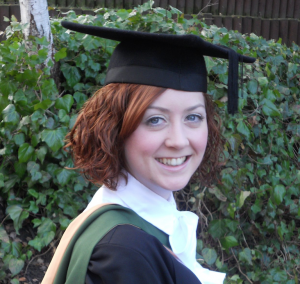3rd Year Psychology student Ryan McGrath interviewed Psychology Lecturer, Dr. Gemma Taylor, who began working at the University in 2016.
Gemma completed her PhD at Sheffield University in 2013. She specialises in developmental psychology, particularly research in children’s learning, memory and language development, with a focus on different media, such as TV, storybooks, and touchscreen apps. Gemma currently teaches on the modules Introduction to Developmental and Social Psychology, Developmental Psychology and Introduction to Individual Differences.
- How did you get into Psychology? I don’t really know, I always thought Psychology would be a fascinating subject to study so I chose to study Psychology at A-Level and I’ve not stopped studying Psychology since then. My intuition was right though, Psychology is an incredibly broad and interesting subject.
- Who is your favourite Psychologist and why? Endel Tulving, he made the distinction between episodic and semantic [memory], based on theoretical grounds before research evidence was conducted to support the idea.
- What psychological concept/topic/issue are you most passionate about? Children and screen media. Children are using screen media for large portions of time on a daily basis but we know so little about the influence that screen media may have on their cognitive development. Given that we’re moving into a digital age, I want to explore how we can make screen media educational for young children so their time spent with screen media can be beneficial for their cognitive development.
- What was the focus of your PhD work? I studied infant learning and memory development. I worked with infants 3.5 – 15 months of age. Within that broad topic I investigated the role of infant looking behaviour during learning on their later learning outcomes and the role of maternal wellbeing on infant interest in their mother’s and a stranger’s face.
- What does an average day of a psychology lecturer entail? Emails, lots and lots of emails! A typical day will involve preparing any teaching materials for that day/week, teaching lectures/seminars/personal tutor sessions, responding to emails from staff and students, and co-ordinating the day to day running of different modules. Finding time to do research is also essential and can include planning research projects, ethics applications, running studies, analysing data and writing up data. This is all fuelled by lots of cups of peppermint tea!
- What makes the Psychology department at the University of Salford unique? The people, the staff and students are all incredibly friendly and welcoming. It’s a really lovely environment to work in.
- If you could choose another profession, what would it be? If I had to choose another profession I would choose something involving either food or yoga because I’m passionate about both. The most important thing for me though is that there is constant opportunity to learn new and interesting things, that’s one of the things that I love about Psychology – there’s always more to learn.
- Do you have a favourite quote? “Learn to appreciate what you have before time makes you appreciate what you had”
- Facebook or Twitter, and Why? I try to use Twitter because it’s a brilliant outlet to share information in a quick and accessible way.
- Which book is a must have for Psychology students? Field, A. (2013). Discovering statistics using IBM SPSS statistics. Sage. I don’t run any analyses without this book by my side!
- What advice would you give to SalfordPsych students? Enjoy your studies, don’t just work toward assignments or exams but work to fuel your own interest in the subject.
- What do you hope for Psychology in the future? I hope that the field continues to grow and to address current questions applicable to our daily lives.
Interviewed by Ryan McGrath: @ryanmcgrath1
Dr. Gemma Taylor: @Gemma_Taylor1

